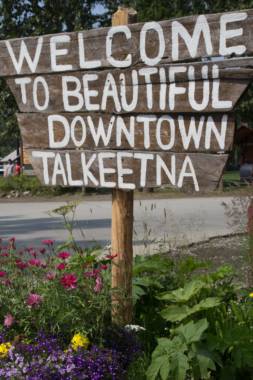In 2020, COVID-19 shook up Talkeetna’s economy. Businesses shut down early in the year and saw only a partial reopening over the summer. This year, things may look like they’re getting back to normal — but it’s not at all business as usual.
The streets of Talkeetna have been full this summer. In a typical year, most visitors would arrive in Alaska on cruise ships or by traveling through Canada in an RV. But this year the cruise industry is a fraction of its normal size, and the Canadian border is still closed to tourists.
Still, Anita Golton of Flying Squirrel Bakery says business is even higher than before the pandemic.
“It’s very busy. I would say much busier that anybody expected,” she said. “I haven’t had time to really look at the numbers, but maybe 25% busier than two summers ago, before COVID.”
She’s noticed a difference in the clientele this year.
“Flying Squirrel is kind of geared toward independent travelers, and in a normal summer most of them would be on buses or coming off the train. This year everyone is an independent traveler. Maybe 90% of the travelers coming to Talkeetna are coming in a rental car,” she said.
Normally, an increase in customers would be great news. But Golton says there haven’t been enough workers to meet the increased demand. She says she’s not the only restaurant with this problem.
“I see all of the restaurants adapting and doing their best to make it work,” she said. “Most businesses have decided to close one day a week or open an hour later or some adaptation that makes it work for their business, so that the staff that they do have is healthy and happy and able to keep this going for another two months.”

DeAnn Autrey, a local realtor, says the housing market has been brisk, too. But that’s not necessarily good news for local businesses and seasonal workers.
“Our listings here in Talkeetna are up 40%. Our sales are way up too. We are up 52% over last year,” she said. “I think a lot of people that were maybe living in Anchorage full time, and both husband and wife maybe working full time, have kind of re-evaluated their lives and they like what Talkeetna has to offer.”
And it’s not just folks from Anchorage buying Talkeetna homes.
“We’re definitely seeing an influx of out-of-state people moving up to Alaska,” Autrey said. “I currently have nine pending sales and out of those nine, three of them are from the lower forty-eight.”
According to Autrey, not all the buyers have plans to move in, which means fewer long-term rentals and fewer housing options for local workers.
“They’re looking for homes that they can Airbnb when they’re not using them,” she said. “Then when they want to come up and use them, they will just plot those dates for themselves.”
Sarah Stevens, director of Sunshine Station Childcare, says she’s having a hard time finding workers, too.
“It kind of went back to business as usual except that we don’t really have any employees,” she said.
Stevens says most of her staff left during the pandemic. She’s trying to juggle keeping the center open with limited staff.
“People need childcare, but I’m having to turn parents and kids away to stay in ratio because I can’t staff it,” she said.
The state mandates a minimum staff-to-child ratio, so without daycare workers, Stevens can only accept a limited number of children. But she also feels the lack of international workers is causing a ripple effect for people who need to fill positions.
“I definitely think we don’t have as many seasonal people as we normally do,” she said. “There aren’t any visas this year, and so the lodge is taking up a lot of the local people. And now everybody’s just trying to work seven jobs.”
The J-1 Visa is a cultural, international exchange program. Hotels and restaurants often participate by bringing in workers from other countries, providing temporary housing and employment.
In June 2020, former President Donald Trump placed restrictions on the J-1 program. Those restrictions expired on April 1st, but the program has been struggling to catch up and process the visas. On April 30th, the U.S. state department released a tier structure for prioritizing visa processing. The J-1 employment visa was in the bottom tier.
At Talkeetna restaurants, wait times for food are longer with smaller staffs. Golton says customers are responding with patience.
“I think a lot of people come from bigger cities where they’re used to waiting in line for things,” she said. “We’re used to something kind of different in Talkeetna, where lines seem out of the ordinary. But overall, people have been very, very patient and grateful that we’re open. And if you smile at them, they smile back.”
Tourist season will be winding down soon. It’s an open question whether the economic changes brought by the pandemic will last.
One thing that Talkeetna residents can count on is winter. Winter means time to rejuvenate and prepare for whatever might happen next.
"back" - Google News
August 05, 2021 at 04:52AM
https://ift.tt/3jn7QCr
Visitors are back in Talkeetna, but it's not business as usual - KTOO
"back" - Google News
https://ift.tt/2QNOfxc
Shoes Man Tutorial
Pos News Update
Meme Update
Korean Entertainment News
Japan News Update
Bagikan Berita Ini















0 Response to "Visitors are back in Talkeetna, but it's not business as usual - KTOO"
Post a Comment